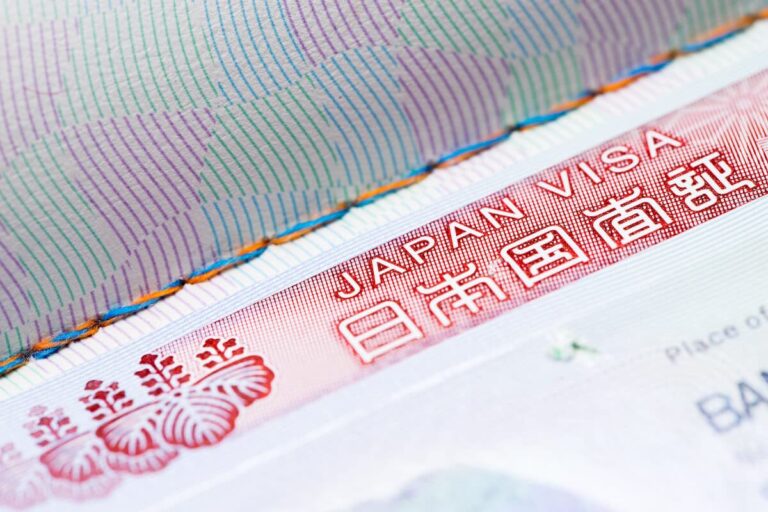Japan attracts visitors worldwide with its delectable cuisine, rich cultural heritage, stunning cherry blossoms, and unique traditions. Beyond tourism, Japan has become a popular destination for foreign workers, including UK nationals, due to its specialised labour needs. If you’re considering growing your career in Japan, you’ll need a Japanese work visa. This document grants permission to enter the country for specific employment purposes.
In this guide, we’ll explore the types of Japanese work visas available, the application process, and the essential documents you’ll need. Whether you’re planning to teach English, manage a business, or work as an artist, this guide will help you understand the process and get started.
Types of Japanese Work Visas
Different Japanese work visas cater to varied professions and stay durations. Your employment background, language skills, and career goals will determine the visa type suitable for you. Here are the most common options for foreign workers:
1. Engineer/Specialist in Humanities/International Services
A versatile category that includes roles such as English teachers, IT specialists, and translators, this visa is one of the most popular among foreigners in Japan.
2. Artist
For creatives like composers, painters, sculptors, and photographers.
3. Journalist
Designed for professionals in print or video media.
4. Entertainer
Covers performers such as dancers, singers, models, musicians, and athletes.
5. Specified Skills
Granted to workers in industries facing labour shortages, such as caregiving, agriculture, and construction.
6. Researcher
For those conducting academic or scientific research at Japanese companies or institutions.
7. Professor
A visa for teaching at Japanese universities or colleges.
8. Intra-Company Transferee
Issued to employees transferring from a branch of their company abroad to a Japanese office.
9. Instructor
Designed for teachers at primary, middle, or secondary schools, including private international schools.
10. Business Manager
For individuals working as company directors, presidents, or executives in Japan.
11. Legal/Accounting Services
For certified lawyers, accountants, and related professionals under Japanese law.
12. Medical Services
For doctors, nurses, dentists, and other healthcare professionals certified in Japan.
Finding Employment in Japan
Before applying for a work visa, you must secure a job in Japan. Most visa applications are contingent on a formal job offer.
Tips for Finding Jobs in Japan
- Search Online Job Portals
Websites like GaijinPot, Daijob, and JobsinJapan are excellent resources for foreign workers. - Learn Japanese
While some roles, especially in international companies, don’t require fluency, knowing Japanese significantly improves your job prospects and helps in daily life. - Understand Workplace Culture
Familiarise yourself with Japanese workplace norms to make a good impression during interviews.
The Work Visa Application Process
Preparation is key when applying for a Japanese work visa. Below is a step-by-step guide:
Step 1: Obtain a Certificate of Eligibility (COE)
The COE is issued by the Japanese Immigration Services Agency and is essential for your visa application. Your employer in Japan will typically handle this process by submitting the necessary documents to the Regional Immigration Bureau. Once approved, the COE will be sent to you.
Step 2: Apply for the Visa at a Japanese Embassy
With the COE in hand, you can apply for a work visa at your nearest Japanese embassy or consulate. Here’s how:
- Download the Application Form
Get the form from the Ministry of Foreign Affairs website. Fill it out accurately and include a passport-size photograph. - Submit Documents
Provide the following:
-
- Completed application form
- Valid passport
- Passport-sized photo(s)
- Original COE
- Pay the Visa Fee
Visa fees vary by nationality. Check with the Japanese embassy for the latest fee structure. - Schedule an Appointment
Submit your application in person or by post, depending on the embassy’s policies.
Step 3: Receive Your Visa
Once approved, your visa will be affixed to your passport. Check the details for accuracy before travelling.
Step 4: Receive Your Residence Card Upon Arrival
At major entry points like Tokyo’s Narita Airport or Osaka’s Kansai Airport, you’ll be issued a residence card (在留カード). This card is crucial for identification and must be carried at all times.
Keeping Your Visa Current
Most work visas are valid for one year initially, with the option to renew. Two to three months before your visa expires, visit your local Regional Immigration Bureau to renew your status. Your employer can assist in requesting a longer stay.
FAQs About Japanese Work Visas
How long is a Japanese work visa valid?
Most visas are issued for one year and can be renewed if eligibility is maintained.
Can I work in Japan on a student visa?
Yes, students can work part-time by obtaining permission from immigration authorities.
Can I work in Japan on a visitor visa?
No, visitor visas do not permit employment.
Does Japan offer a digital nomad visa?
Currently, Japan does not have a specific visa for digital nomads.
What is a working holiday visa?
UK citizens aged 18-30 can apply for a working holiday visa, which allows temporary work while travelling in Japan.
Can my family join me in Japan?
Family members must apply for dependent visas separately.
Does a work visa lead to permanent residency?
Not directly. Permanent residency typically requires 10 years of continuous residency, though exceptions exist for highly skilled professionals.
Can I access public healthcare with a work visa?
Yes, employers usually enrol workers in Japan’s public healthcare system.
